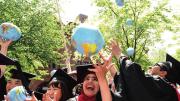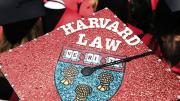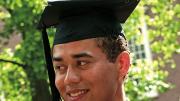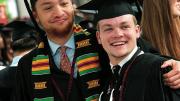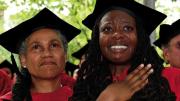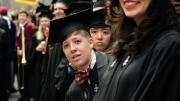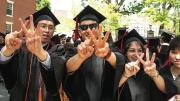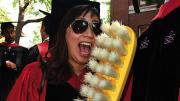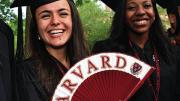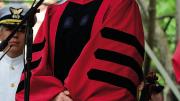Harvard’s 364th was a mannerly, by-the-book Commencement. After a year of campus protests seeking divestment from fossil-fuel investments, advocates let signs and buttons carry their message. The graduates-to-be, normally somewhat spontaneous, barely deviated from the Morning Exercises script: eager-beaver M.B.A. candidates, directed by the provost to rise for their degrees, had already done so, as he observed; Kennedy School students let loose “Ellwood! Ellwood!” cheers for their departing dean, David T.; and undergraduates greeted their new leader with shouts of “Dean Rakesh!” Khurana—the sorts of disobedience acceptable to administrators. And although rising heat and humidity from Tuesday through Thursday suggested rain (giving graduation planners something to fret about), the thunderstorms steered north and west, leaving celebrants warm at worst.
The proceedings were serious-minded, too. At Phi Beta Kappa’s 225th literary exercises, in Sanders Theatre on Tuesday morning, May 26, one of the works read by poet Laura Kasischke, “To Try,” opens with lines that seemed to offer the audience a wish, a prayer, or a set of instructions on how to encounter the world: “Like a bird in no hurry, flying/to fly/not to fly somewhere: May I./And the brain, a gate, not/open or closed.”
That theme, about how to be in the world, unspooled in part during the many talks that followed by playing off the tensions between disruptive innovation, led by determined individualists, and the essential efficacy of institutions. The presence of speakers such as Intuit co-founder Scott Cook, M.B.A. ’76 (at Harvard Business School’s class day) perhaps symbolized the new, technologically driven innovation era—as did the appearance of Facebook founder Mark Zuckerberg ’06 (literally, on Commencement day, and figuratively, in President Drew Faust’s afternoon address). Faust, worried about the excessively inward focus of the selfie generation and rising hostility toward organizations, made the case for institutions, including the one she leads (see “Addressing Big Questions”). Guest speaker Deval L. Patrick talked about the worthy challenges (poverty, racism, climate change) to which institutions—and organizing and political power—might be applied (see “Addressing Big Questions”).
The lives of several guests embodied the fruitful intersection of issues commanding action and compelling responses: individually at first, and then on a larger, institutional scale. At its class day, the Law School heard from former U.S. Representative Gabrielle Giffords of Arizona—grievously wounded by a would-be assassin in 2011—and her husband, retired astronaut and U.S. Navy pilot Mark Kelly; they founded and lead Americans for Responsible Solutions, which focuses on reducing gun violence. The Graduate School of Design’s keynoter, Rick Lowe, launched Project Row Houses, an arts-based, urban-revitalization enterprise, in an African-American neighborhood in Houston. And the Kennedy School’s guest, David Miliband, president and CEO of the International Rescue Committee, aids those displaced by conflict and disaster (often heartbreaking work much in demand of late, from Iraq and Syria to Bangladesh, Myanmar, and Nepal).
Two honorands represented this commitment at the highest level. Gynecologist Denis Mukwege founded—and despite an attempted assassination, continues to lead—Panzi Hospital, in the Democratic Republic of Congo, to care for the thousands of women in his conflict-plagued country who are subjected to sexual violence and rape, both deployed as weapons of war. And closer to home, in a year when (as Deval Patrick forcefully put it) “The killings of unarmed black men by unaccountable police officers in Ferguson, Missouri, and Staten Island, New York, moved young people and many others to take to the streets to proclaim that Black Lives Matter,” the work of Bryan Stevenson, J.D.-M.B.A. ’85, on behalf of those ill-served by the criminal-justice system, resonated particularly loudly. Faust cited him in her Baccalaureate address, as did Pusey minister Jonathan Walton in his benediction at the end of the Morning Exercises.
Harvard’s own engagement with big issues played out during the week, too. Patrick urged the accomplished graduates “to be a little uneasy” about what they knew, and about the state of the world, and to become “uneasy leaders” addressing urgent issues like climate change. One leader thus made uneasy was President Faust, seated to his left; she was on the receiving end of days of sit-ins by divestment advocates—both students and their alumni and faculty supporters. Tellingly, the first honorary degree conferred went to Columbia’s Wallace S. Broecker, the “grandfather of climate science.”
In the afternoon, the first Harvard Medalist was Charles J. Egan Jr. ’54, a longtime alumni interviewer and fundraising leader. He was also, in the months before becoming president of the Harvard Alumni Association, a leading critic of proponents of divestment from South Africa in the late 1980s, and a campaigner against divestment advocates who ran as petition candidates for election to the Board of Overseers. (Archbishop Desmond Tutu, LL.D. ’79, winner of the 1984 Nobel Peace Prize, was elected as one such candidate; the magazine reported on the controversy in the July-August 1989 issue.) Much of The Harvard Crimson’s twenty-fifth reunion coverage focused on the divestment debates during the class of 1990’s College years.
Intellectual pride of place for the week went to Radcliffe Day. Friday morning’s panel of all-star legal scholars assessed the work of another eminent institution: the U.S. Supreme Court under current chief justice John G. Roberts ’76, J.D. ’79. That was prelude to the lunchtime recognition of associate justice Ruth Bader Ginsburg, L ’59, LL.D. ’11, as this year’s Radcliffe Medalist—with prefatory remarks by her retired colleague David H. Souter ’61, LL.B. ’66, LL.D. ’10. (Radcliffe previously honored former associate justice Sandra Day O’Connor, so schedulers for Sonia Sotomayor and Elena Kagan, J.D. ’86, should keep final Fridays in May open. They are probably not yet in line to be portrayed in a movie featuring actress Natalie Portman ’03, who will play Ginsburg in the forthcoming “On the Basis of Sex.” Portman, the College’s class day headliner, was odds-on the most sensibly clothed speaker during a summery week, in a crisp eggplant-print dress—befitting a vegetarian.) Radcliffe was rewarded with the week’s best day: clear, dry, in the 70s, courtesy of Boston’s then-deepening drought.
For all the high-mindedness, there was time for art as well. Renée Fleming sang “America the Beautiful,” sustaining a recent Commencement practice of coaxing a performance from an arts honorand. When she received her degree, the Commencement Choir sang a bit of her beloved Dvořák. (When Peter Salovey, president of Yale, received his degree, the University Band played a few bars of the Bulldogs’ fight song.)
And room for beauty, too. Amid the morning-after detritus, when discarded Crimsons and spent iced-coffee cups littered Harvard Yard, the campus rose above it all. The yellowwood trees planted two decades ago to bloom during Commencement were in full, splendid flower, their pendant racemes (like white wisterias) perfuming Tercentenary Theatre—at the heart of a great institution.
